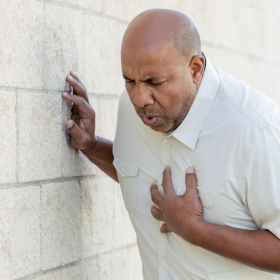Sudden Cardiac Arrest

Sudden Cardiac Arrest (SCA): Understanding the Silent Threat
Sudden Cardiac Arrest (SCA) is a life-threatening condition where the heart unexpectedly stops beating. Unlike a heart attack, which is caused by a blockage in blood flow to the heart, SCA occurs due to an electrical malfunction in the heart, leading to an irregular heartbeat (arrhythmia). This can happen to anyone, even those without a prior history of heart disease, and can result in death within minutes if not treated immediately.
In the post-COVID era, the incidence of SCA has risen, particularly among younger individuals, making awareness and timely intervention more critical than ever.
Symptoms of Sudden Cardiac Arrest
SCA often occurs without warning. Key symptoms include:
- Sudden loss of consciousness
- No breathing or gasping for air
- No detectable pulse

Immediate Treatment is Critical
The first few minutes after SCA are crucial. The primary goal is to restore the heart’s normal rhythm as quickly as possible. This is typically achieved through
- Cardiopulmonary Resuscitation (CPR): To maintain blood flow to vital organs.
- Automated External Defibrillator (AED): To deliver an electric shock to the heart and restore its normal rhythm.
In some cases, medications or advanced medical interventions may be required to stabilize the patient.
Prevention and Long-Term Care
Preventing SCA involves identifying risk factors, such as underlying heart conditions, and implementing preventive measures. Dr. [Doctor’s Name], a renowned cardiologist in Chennai, is deeply committed to raising awareness about SCA and its prevention. With years of expertise in cardiology, he has shared his knowledge through various NEWS channels (insert link) and collaborates with organizations like the International Rotary Club to educate communities on life-saving techniques like CPR.
Get in Touch
Contact Info
Email Address
deepchandh@gmail.com
Kavery Alwarpet
Director of Cardiac Electrophysiology and Senior Consultant in Cardiology.
No: +91 8056204449.
Kavery Vadapalani
Director of Cardiac Electrophysiology and Senior Consultant in Cardiology..
No: +91 9043632236.
Raja Multi-Specialty Clinic
Plot no 1, Nolambur Phase 1, VGN Nagar Phase 1, Nolambur, Ambattur Industrial Estate, Chennai, Tamil Nadu 600037
No : +918608601590
Services

Sudden Cardiac Arrest & Device Therapies
Saving Lives with Advanced Sudden Cardiac Arrest Management
Sudden Cardiac Arrest (SCA) is a life-threatening condition where the heart suddenly stops beating. Without immediate intervention, it can be fatal. Early detection, timely intervention, and advanced cardiac devices like Implantable Cardioverter Defibrillators (ICD) and Loop Recorders (ILR) can prevent complications and save lives.
We specialize in cutting-edge device-based therapies that help restore normal heart function and reduce the risk of sudden cardiac events.
Sudden Cardiac Arrest Management
Preventing Life-Threatening Heart Events
Sudden Cardiac Arrest (SCA) occurs when the heart’s electrical system malfunctions, leading to an abrupt loss of heartbeat, breathing, and consciousness. Unlike a heart attack, which results from blocked arteries, SCA is an electrical issue that requires immediate medical intervention.
Key Symptoms of Sudden Cardiac Arrest:
- Sudden loss of consciousness
- No breathing or gasping for air
- No detectable pulse

Why Early Diagnosis is Critical
- Increases survival rates with timely medical intervention
- Prevents recurrent cardiac episodes
- Allows for long-term heart health management
Defibrillator (ICD) Implantation
Life-Saving Protection Against Cardiac Arrest
An Implantable Cardioverter Defibrillator (ICD) is a small device placed under the skin to monitor heart rhythm and deliver an electrical shock if a life-threatening rhythm is detected.
Who Needs an ICD?
- Patients with a history of sudden cardiac arrest or severe arrhythmias
- Those diagnosed with ventricular tachycardia (VT) or ventricular fibrillation (VF)
- Individuals with a high risk of heart failure or weakened heart function
Benefits of an ICD Implant:
- Monitors & corrects life-threatening arrhythmias automatically
- Reduces risk of sudden cardiac death
- Improves long-term heart function & stability
Subcutaneous ICD (S-ICD) Implantation
Minimally Invasive Protection for Cardiac Arrest
The Subcutaneous Implantable Cardioverter Defibrillator (S-ICD) is an advanced defibrillator placed under the skin, without direct contact with the heart. It is ideal for patients needing protection from sudden cardiac arrest but who do not require pacemaker therapy.
Key Advantages of S-ICD
- No leads inside the heart, reducing infection risks
- Detects & treats dangerous arrhythmias
- Best option for younger patients or those with complex anatomy
Implantable Loop Recorder (ILR) Placement
Advanced Heart Monitoring for Early Detection
An Implantable Loop Recorder (ILR) is a tiny device inserted under the skin to continuously monitor heart rhythms for weeks, months, or even years. It helps diagnose unexplained fainting, palpitations, and hidden arrhythmias that may not appear during standard tests like ECG or Holter monitoring.
Who Should Consider an ILR?
- Individuals experiencing unexplained fainting or dizziness
- Patients with suspected arrhythmias not detected on routine tests
- Those at risk of stroke due to undiagnosed atrial fibrillation (AFib)
Why ILR Monitoring is Effective
- Captures irregular heart rhythms missed by short-term tests
- Helps doctors make accurate diagnosis & treatment plans
- Provides long-term heart rhythm insights



